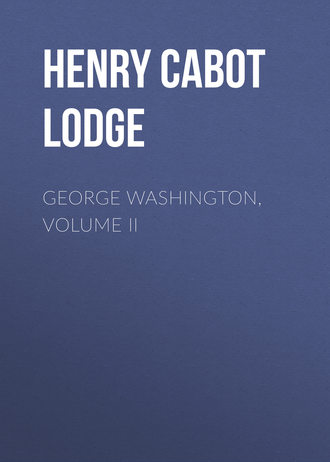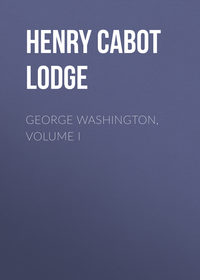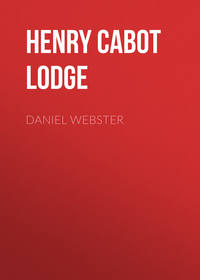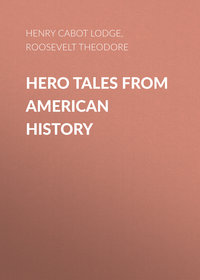 полная версия
полная версияGeorge Washington, Volume II
He had made a good choice in Thomas Pinckney, better even than he knew. Triumphing over all obstacles, with persistence, boldness, and good management, Pinckney made a treaty and brought it home with him. Still more remarkable was the fact that it was an extremely good treaty, and conceded all we asked. By it the Florida boundary was settled, and the free navigation of the Mississippi was obtained. We also gained the right to a place of deposit at New Orleans, a pledge to leave the Indians alone, a commercial agreement modeled on that with France, and a board of arbitration to settle American claims. All this Pinckney obtained, not as the representative of a great and powerful state, but as the envoy of a new nation, distant, unknown, disliked, and embroiled in various complications with other powers. Our history can show very few diplomatic achievements to be compared with this, for it was brilliant in execution, and complete and valuable in result. Yet it has passed into history almost unnoticed, and both the treaty and its maker have been singularly and most unjustly neglected. Even the accurate and painstaking Hildreth omits the date and circumstances of Pinckney's appointment, while the last elaborate history of the United States scarcely alludes to the matter, and finds no place in its index for the name of its author. It was in fact one of the best pieces of work done during Washington's administration, and perfected its policy on a most difficult and essential point. It is high time that justice were done to the gallant soldier and accomplished diplomatist who conducted the negotiation and rendered such a solid service to his country. Thomas Pinckney, who really did something, who did work worth doing and without many words, has been forgotten, while many of his contemporaries, who simply made a noise, are freshly remembered in the pages of history.
There was, however, another nation out on our western and northern border more difficult to deal with than Spain; and in this quarter there was less evasion and delay, but more arrogance and bad temper. It was to England that Washington turned first when he took up the presidency, and it was in her control of the western posts and her influence among the Indian tribes that he saw the greatest dangers to the continental movement of our people. Morris, as we have seen, sounded the British government with but little success. Still they promised to send a minister, and in due time Mr. George Hammond arrived in that capacity, and opened a long and somewhat fruitless correspondence with the Secretary of State on the various matters of difference existing between the two countries. This interchange of letters went on peaceably and somewhat monotonously for many months, and then suddenly became very vivid and animated. This was the effect of the arrival of Genet; and at this point begins the long series of mistakes made by Great Britain in her dealings with the United States.
The principle of the declaration of neutrality could be easily upheld on broad political grounds, but technically its defense was by no means so simple. By the treaty of commerce with France we were bound to admit her privateers and prizes to our ports; and here, as any one could see, and as the sequel amply proved, was a fertile source of dangerous complications. Then by the treaty of alliance we guaranteed to France her West Indian possessions, binding ourselves to aid her in their defense; and a proclamation of neutrality when France was actually at war with a great naval power was an immediate and obvious limitation upon this guarantee. Hamilton argued that while France had an undoubted right to change her government, the treaty applied to a totally different state of affairs, and was therefore in suspense. He also argued that we were not bound in case of offensive war, and that this war was offensive. Jefferson and Randolph held that the treaties were as binding and as much in force now as they had ever been; but they both assented to the proclamation of neutrality. There can be little question that on the general legal principle Jefferson and Randolph were right. Hamilton's argument was ingenious and very fine-spun. But when he made the point about the character of the war as relieving us from the guarantee, he was unanswerable; and this of itself was a sufficient ground. He went beyond it in order to make his reasoning fit existing conditions consistently and throughout, and then it was that his position became untenable. In reality the French revolution was showing itself so wholly abnormal and was so rapid in its changes, that as a matter of practical statesmanship it was worse than idle even to suppose that previous treaties, made with an established government, were in force with this ever-shifting thing which the revolution had brought forth. Still the general doctrine as to the binding force of treaties remained unaltered, and this conflict between fact and principle was what constituted the great difficulty in the way of Washington and Hamilton. The latter met it with one clever and adroit argument which it was difficult to sustain, and avoided it with a second, which was narrower, but at the same time sound and all-sufficient, as to the character of the war. Jefferson and Randolph stood by the general principle, but abandoned it in practice under pressure of imperious facts, as men generally do, while France herself soon removed all technical difficulties by abrogating by her measures the treaty of commerce, an act which relieved us of any further obligations and justified Hamilton's position. But in the beginning this was not known, and yet action was none the less necessary.
The result was right, and Washington had his way, which it must be confessed he had fully determined on before his cabinet supplied him with technical arguments.
All these points must have been plain enough to Hammond and the English ministry. They could not see the full scope of the neutrality policy in its national meaning, and they very naturally failed to perceive that it marked the rise of a new power wholly disconnected from Europe, to which their own views were confined. But they were quite able to understand the immediate aspect of the case. They saw Washington adopt and carry out a policy of dignified impartiality; they were well able to value rightly the technical objections which stood in his path, and they could see also that this policy was at the outset very unpopular in America. The remembrance of old injuries and of the war for independence was still fresh, and the hatred of England was well nigh universal in the United States. On the other hand, a lively sense of gratitude to France, and a sympathy with the objects of the revolution, made affection for that country uniform and general. The easy and popular course was for our government to range itself more or less directly with the French, and the refusal to do so was bold and in the highest degree creditable to the administration. It was, moreover, an important advantage to England that the United States should not ally themselves with her enemy, for next to herself, the Americans were the great seafaring people of the world, and were in a position to ravage her commerce, and, aided by France, to break up her West Indian possessions. If the United States had followed the natural prejudices of the time and had espoused the cause of France, it would have been wise and right for England to attack them and break them down if possible. But when, from a sense of national dignity and of fair dealing, the United States stood apart from the conflict and placed their former foe on the same footing as their friend and ancient ally, a very small allowance of good sense would have led the British ministry to encourage them in so doing. By favorable treatment, and by a friendly and conciliatory policy, they should have helped Washington in his struggle against popular prejudices, and endeavored by so doing to keep the United States neutral, and lead them, if possible, to their side; but with a fatuity almost incomprehensible they pursued an almost exactly opposite course. By similar conduct England had brought on the war for independence, which ended in the division of her empire. In precisely the same way she now proceeded to make it as arduous as possible for Washington to maintain neutrality, and thereby played directly into the hands of the party that supported France. The true policy demanded no sacrifices on the part of Great Britain. Civility and consideration in her dealings, and a careful abstention from wanton aggression and insult, were all-sufficient. But England disliked us, as was quite natural; she did not wish us to thrive and prosper, and she knew that we were weak and not in a position to enter upon an offensive war.
As soon as it became known that Genet's privateers, manned by seamen enlisted in our ports, were preying on British commerce, and that the French man-of-war L'Ambuscade had taken an English vessel, The Grange, within the capes of the Delaware, Hammond filed a memorial in regard to these incidents. In so doing he was of course quite right, and the government responded immediately, and proceeded in good faith to make every effort to repair these breaches of neutrality, and to redress the wrongs suffered by Great Britain. Hammond, however, instead of doing all in his power, not merely to gain his own ends, but to make it easy for our government to satisfy him, assumed at once a disagreeable tone with a strong flavor of bullying, which was not calculated to conciliate the statesmen with whom he was dealing. It was a small matter enough, but unfortunately it was an indication of what was to come.
On November 6, 1793, a British order in council was passed, but not immediately published, directing the seizure of all vessels carrying the produce of the French islands, or loaded with provisions for the use of the French colonies. The object of the order was to destroy all neutral trade, and it was aimed particularly at the commerce of the United States. The moment selected for its adoption was when the troubles with Genet had culminated, when we were on the point of getting rid of that very objectionable person, and when we had proved that we meant to maintain an honest and a real neutrality. It was as well calculated as any move could have been to drive us back into the arms of France, yet the manner of executing the order was far worse than the order itself. Our merchantmen and traders had been quick to take advantage of the opening of the French ports, and they had gone in swarms to the French islands. Now, without a word of warning, their vessels were seized by the cruisers of a nation with which we were supposed to be at peace. Every petty governor of an English island sat as a judge in admiralty. Many of them were corrupt, all were unfit for the duty, and our vessels were condemned and pillaged. The crews were made prisoners, and in many cases thrown into loathsome and unhealthy places of confinement, while the ships were left to rot in the harbors. The tale of the outrages and miseries thus inflicted on citizens of the United States without any warning, and by a nation considered to be at peace with us, fills an American with shame and anger even to-day. If our people remonstrated, they were told that England meant to have no neutrals, and that six of their frigates could blockade our coast. A course of kind treatment would have made us the friends of Great Britain, but the experiment was not even tried. The truth was that we were weak, and this was not only a misfortune but apparently an unpardonable sin. England could not conquer us, but she could harry our coasts, and let loose her Indians on our borders; and we had no navy with which to retaliate. She meant that there should be no neutrals, and so adopted a policy which would make us the active ally of France. It was no answer to say, what was perfectly true, that French privateers preyed upon our commerce with that fine indifference to rights and treaties which characterized the governments of the Revolution. If both sides maltreated us, the natural course was to unite with the power to which we at least owed a debt of gratitude.
About the same time a speech was reported from Quebec, in which Lord Dorchester told the Indians that they should soon take the war-path for England against the United States. Lord Grenville denied in Parliament, and subsequently to Jay, that the ministry had ever taken any step to incite the Indians against the United States, and the authenticity of Lord Dorchester's utterances has been questioned in later days; but it was not disavowed at the time, even by Hammond in a sharp correspondence which he held on that and other topics with Randolph. The speech, as is now known and proved, was probably made, whether it was authorized or not, and it was universally accepted at the moment as both true and authoritative.
This menace of desolating savage war in the West, in addition to the unquestioned outrages to our seamen, the loss of our ships, and the destruction of our commerce, with consequent ruin to all our seaboard towns, led to a general outburst of indignation from men of all parties, and Congress began to prepare for war. Many of the methods suggested were feeble and inadequate, but there could be no doubt of either the spirit or intentions which dictated them. News that an order of January 8, 1794, modified that of November 6, and confined the seizure to vessels carrying French property, and reports that some of our vessels were being restored, moderated the movements of Congress, but it was nevertheless evident that a resolution cutting off commercial intercourse with Great Britain would soon pass. In the existing state of things such a step in all probability meant war, and Washington was thus brought face to face with the most serious problem of his administration. It did not take him unawares, nor find him unprepared, for he had anticipated the situation, and his mind was made up. He had no intention of letting the country drift into war without a great effort to prevent it, and the time for that effort had now come. As in the case of Spain, he was resolved to send a special envoy to make a treaty. His first choice for this important mission was Hamilton, which, like most of his selections, would have been the best choice that could have been made. Hamilton, however, was so conspicuous as the great leader of the party which supported both the foreign and domestic policy of the administration, and he was so hated by the opposition, that a loud outcry was at once raised against his appointment. At that particular juncture it was very important that the envoy should depart with as much general good-will and public confidence as possible, so Hamilton sacrificed himself to this necessity, and withdrew his name voluntarily. His withdrawal was a mistake, but it was a wholly natural one under the circumstances. Washington then made the next best choice, and appointed John Jay, who was a man of most spotless character, honorable, high-minded, and skilled in public affairs. He was chief justice of the United States, and that fact gave additional weight to the mission. The only point in which he fell behind Hamilton was in aggressiveness of character, and this negotiation demanded, not merely firmness and tact, which Jay had in abundance, but a boldness verging on audacity. The immediate purpose, however, was answered, and Jay set forth on his journey with much good feeling toward himself, and with a very solemn sense among the people of the gravity of his undertaking. Washington himself saw Jay depart with many misgivings, and the act of sending such a mission at all was very trying to him, for the conduct of England galled him to the quick. He had long suspected Great Britain, as well as Spain, of inciting the Indians secretly to assail our settlements, and knowing as he did the character of savage warfare, and feeling deeply the bloodshed and expense of our Indian wars, he cherished a profound dislike for those who could be capable of promoting such misery to the injury of a friendly and-civilized nation. As England became more and more hostile, he made up his mind that she was bent on attacking us, and in March, 1794, he wrote to Governor Clinton that he had no doubts as to the authenticity of Lord Dorchester's speech, and that he believed England intended war. He therefore urged the governor to inquire carefully into the state of feeling in Canada, and as to the military strength of the country, especially on the border. He put no trust in the disclaimers of the ministry when he saw the long familiar signs of hostile intrigue among the Indians, and he was quite determined that, if war should come, all the suffering should not be on one side.
This belief in the coming of war, however, only strengthened him in his well-matured plans to leave nothing undone to prevent it. It was in this spirit that he despatched the special mission, although his first letter to Jay shows that he had no very strong hopes of peace, and that his uppermost thoughts were of the wrongs which had been perpetrated, and of the perils which hung over the border. He did not wish the commissioner to mince matters at all. "There does not remain a doubt," he wrote, "in the mind of any well-informed person in this country, not shut against conviction, that all the difficulties we encounter with the Indians, their hostilities, the murder of helpless women and innocent children along our frontiers, result from the conduct of the agents of Great Britain in this country.... Can it be expected, I ask, so long as these things are known in the United States, or at least firmly believed, and suffered with impunity by Great Britain, that there ever will or can be any cordiality between the two countries? I answer, No. And I will undertake, without the gift of prophecy, to predict that it will be impossible to keep this country in a state of amity with Great Britain long, if the posts are not surrendered. A knowledge of these being my sentiments would have little weight, I am persuaded, with the British administration, and perhaps not with the nation, in effecting the measure; but both may rest satisfied that, if they want to be in peace with this country, and to enjoy the benefits of its trade, to give up the posts is the only road to it. Withholding them, and the consequences we feel at present continuing, war will be inevitable."
Jay meantime had been well received in England. Lord Grenville expressed the most friendly feelings, and every desire that the negotiation might succeed. Jay was also received at court, where he was said to have kissed the queen's hand, a crime, so the opposition declared, for which his lips ought to have been blistered to the bone, a difficult and by no means common form of punishment. Receptions, dinner parties, and a ready welcome everywhere, did not, however, make a treaty. When it came to business, the English did not differ materially from their neighbors whom Canning satirized.
"The fault of the DutchIs giving too little and asking too much."So the Americans now found it with Lord Grenville. There were many subjects of dispute, some dangerous, and all requiring settlement for the benefit of both countries. Boundaries, negro claims, and British debts were easily disposed of by reference to boards of arbitration. Two others, awkward and threatening, but not immediately pressing, were the impressment of British seamen, real or pretended, from American ships, and the exclusion of American vessels from the trade of the British West Indies. The latter circumstance was no doubt disagreeable to us, and deprived us of profit; but it is difficult to see what right we had to complain of it, for the ports of the British West Indies belonged to Great Britain, and if she chose to close them to us, or anybody else, she was quite within her rights. At all events, Lord Grenville declined to let us in, except in a very limited way and under most onerous conditions. The right of search and the right of impressment were simply the rights of the powerful over the weak. England wanted to get seamen where she could for her navy; and so long as she could violate our flag and carry off as recruits any able-bodied seaman who spoke English, she meant to do it. It was worse than idle to negotiate about it. When we should be ready and willing to fight we could settle that question, but not before. In due time we were ready to fight. England defeated us in various battles, ravaged our coasts, and burned our capital; while we whipped her frigates and lake flotillas, and repulsed her Peninsula veterans with heavy slaughter at New Orleans. Impressment was not mentioned in the treaty which concluded that war, but it ended at that time. The English are a brave and combative people, but rather than get into wars with nations that will fight, and fight hard, they will desist from wanton and illegal aggressions, in which they do not differ greatly from the rest of mankind; and so the practical abandonment of impressment came with the war of 1812. The fact was officially stated by Webster, not many years later, when he announced that the flag covered and protected all those who lived or traded under it.
But in 1794 impressment was a negotiable question, because we were not ready to go to war about it then and there. So Jay, wisely enough, allowed this especial from of bullying to drift aside, along with the exclusion from the West India trade, and addressed himself to the two points which it was essential to have settled at that particular moment. These questions were: the retention of the western posts, and neutral rights at sea. In return for the agreement on our part to pay the British debts, as determined by arbitration, England agreed to surrender the posts on June 1, 1796. There was to be mutual reciprocity in inland trade on the North American continent; but coastwise, while we opened all our harbors and rivers to the British, they shut us out from theirs in the colonies and the territory of the Hudson's Bay Company. In the eighteen articles, limited in duration to two years after the conclusion of the existing war, a treaty of commerce was practically formed and neutral rights dealt with. We were to be admitted to British ports in Europe and the East Indies on terms of equality with British vessels, but we were refused admission to the East Indian coasting trade, and to that between East India and Europe. We gained the right to trade to the West Indies, but only on condition that we should give up the transportation from America to Europe of any of the principal products of the colonies. These were enumerated, and besides sugar, molasses, coffee, and cocoa, included cotton, which had just become an export from the southern States, and which already promised to assume the importance that it afterwards reached. The vexed questions of privateers, prizes, and contraband of war were also settled and determined.
The treaty as a whole was not a very brilliant one for the United States, but its treatment was far worse than its deserts, and it was received with such a universal outburst of indignation that even to this day it has never freed itself from the bad name it then acquired. Nobody, not even its supporters, liked it, and yet it may be doubted whether anything materially better was possible at the time. The admirers of Hamilton, from that day to this, have believed that if he had been sent, his boldness, ability, and force would have wrung better terms from England. This is not at all improbable; but that they would have been materially improved, even by Hamilton, does not seem very likely. The treaty, in reality, was by no means bad; on the contrary, it had many good points. It disposed satisfactorily and fairly of all the minor questions which were vexatious and threatening to the peaceful relation of the two countries. It settled the British debts, gave us the western posts, which was a matter of the utmost importance, and arranged the disputed and thorny question of neutral rights, for the time being at least. It left impressment totally unsettled, simply because we were still too weak to be ready to fight England profitably on that theme. It opened to us the West Indian ports, which was the matter most nearly affecting our interests and our pockets, but it did so under limitations and concessions which were excessive and even humiliating. We were obliged to pay a price far too high for this coveted privilege, and it was on this point that the controversy finally hinged.
The treaty reached Philadelphia on March 7. Nothing was said of its arrival, which does not seem to have been known to any one but the President and Randolph, who had meantime succeeded Jefferson as Secretary of State. Three months later, on June 8, the Senate was called together in special session, and the treaty was laid before them. Washington did not like it and never changed his feeling in that respect, but he had made up his mind upon full reflection to accept it; and the Senate, after most careful consideration, voted by exactly the necessary two thirds to ratify it, provided that the objectionable West Indian article could be modified. On no terms could we consent to forego the exportation of cotton, and it is difficult to see how the Senate could have taken any other ground upon this point. Their action, however, opened some delicate questions. Washington wrote to Randolph: "First, is or is not that resolution intended to be the final act of the Senate; or do they expect that the new article which is proposed shall be submitted to them before the treaty takes effect? Secondly, does or does not the Constitution permit the President to ratify the treaty, without submitting the new article, after it shall be agreed to by the British King, to the Senate for their further advice and consent?"





